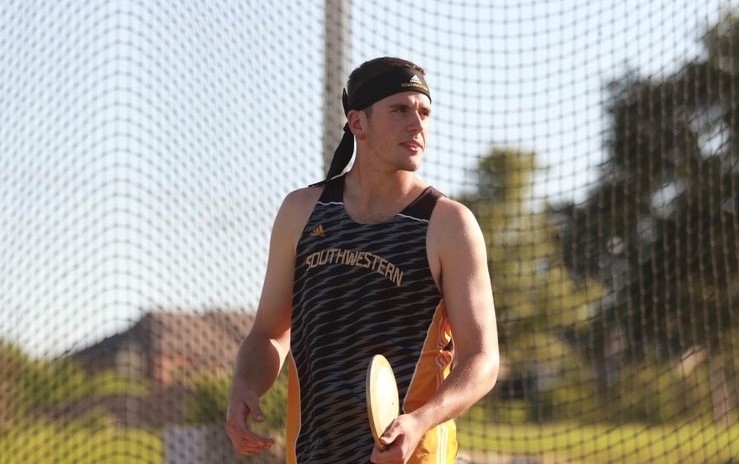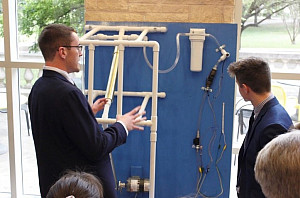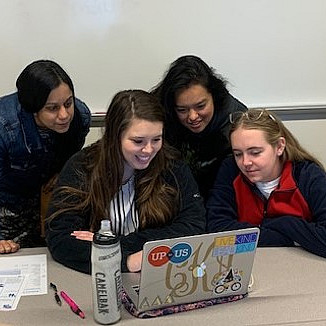News
With Energy to Spare
October 27, 2020
October 27, 2020
Open gallery

Back in mid-April, you could find Mike May ’20 working 32 to 40 hours a week as an overnight stocker at a home-improvement retail chain. At the time, he was trying to make some extra money so he could buy a car that he could take to New Hampshire, where he would soon be starting a Ph.D. program in engineering at Dartmouth. He was also finishing up his senior capstone research for physics, building a thermoacoustic generator that would produce electrical energy from any viable heat source. Finals for his Math Methods in Physical Science class were looming, too. Then there was the presentation of his business proposal for the Lab for Innovative Ventures and Entrepreneurship (LIVE) to prepare for the Research and Creative Works Symposium. And all of this was on top of completing coursework that, no thanks to the pandemic that shall not be named, had transitioned online—a format that, May admits, felt somewhat “incomplete” given how much he’s benefited these past several years from that all-important “student–teacher interaction” with Southwestern professors who “genuinely care.”
The full-time work schedule alone would be enough to exhaust most people these days. So how May managed to labor all night and still excel—not just survive, but excel—through his final assignments at SU might bewilder some. But it turns out that motivation and self-discipline have seen the recent graduate through not just a rigorous academic curriculum but also a full slate of cocurriculars during his four years at the university. Besides an internship at the Tarrant Regional Water District in his hometown of Fort Worth and membership in honor societies and academic organizations, perhaps most impressive has been his role as a consummate student–athlete: May competed in not just basketball but also track and field, representing men’s basketball on the SU Student Athletic Advising Committee. He discovered an anchoring community of supportive friends who share his faith in the Fellowship of Christian Athletes (FCA), which he would go on to lead as president. He also worked as a referee and supervisor for Southwestern Intramural and Recreational Activities, or SIRA. Unsurprisingly, in 2019, he was recognized for his leadership, character, and community service by the Southern Collegiate Athletic Conference.
May credits the opportunity to participate in so many enriching experiences in the classroom, in the lab, on the court, on the field, and in the community to being a STEM major at a liberal-arts university. “The access that you have to different departments sets Southwestern apart,” he says.
For example, May enrolled in LIVE even though he had never taken a business course before; he was, after all, a declared STEM major. In high school, he had discovered that he really enjoyed his physics courses conceptually—even if his technical capabilities were a little less than stellar, he remembers with a self-deprecating laugh. When he arrived at Southwestern, he thrived while engaging in hands-on activities such as labs and working with peers, which he was able to do in some of his favorite physics courses, such as constructing a rocket in Classical Mechanics or coding robots and building a remote-control car in Electronics. “We actually got to use math and science to work on solving real-world problems,” he reflects. “I really like applying the concepts to the real world, so I decided to major in physics and study engineering.”
But as any liberal-arts grad would tell you, learning takes place whether you’re
Cultivated through Southwestern’s Paideia philosophy of education, that skill of molding new ideas and viewing puzzles through multiple perspectives has affected May’s thinking beyond academics; it’s a way of seeing and a method of creative problem-solving that will influence his career and that he applies to everyday life. “Even outside SU, it puts you on a path to search out those interdisciplinary ideas,” he shares. For instance, as he was reading The Design of Everyday Things, May was inspired by how the author, Donald Norman, “bridges engineering and psychology. You have to engineer things so that people understand their use and desire to use them. You can make something beautiful, but if people don’t know how to use it, they’re not going to get it.” Just for fun, May was simultaneously reading a book about the history of energy. “So just from being at Southwestern, you realize the value of understanding such things as the intersection of history and engineering and psychology.”
(Please keep in mind that he was reading these tomes for pleasure as a full-time student working a full-time job. May might now be pursuing graduate studies in engineering because he’s fascinated by complex topics such as designing more sustainable infrastructure and developing renewable energy, but one begins to suspect that he is, himself, composed of limitless energy.)
May is now applying that interdisciplinary thinking as a doctoral student at Dartmouth’s Thayer School of Engineering, in New Hampshire. He was drawn there by the faculty in the department, many of whom share May’s entrepreneurial spirit and can boast more than their share of patents; he plans to seek out their wisdom just as he’s benefited from the expertise of his Southwestern professors. Meanwhile, he’s collaborating with his advisors researching the geophysics of sea ice at the U.S. Army Cold Regions Research and Engineering Laboratory. During his grueling 25-hour interview for the Ph.D. program, one of those advisors tested how May thought through things as they donned cold gear and traveled far into the mountains in Fairbanks, Alaska, on snowmobiles. May says that it was exhausting, but it was also thrilling. “For me, it’s the adventure of it,” he says with an enormous smile. “Going up into an area where not many people have been and just seeing an area of nature that was absolutely beautiful, I was like, “Yeah, OK, that’s where I want to end up being.”
The Decatur-born and Fort Worth–raised SU grad may be having the time of his life measuring and monitoring Arctic sea ice over the next several years, but he will be kept warm by the memories he’s made with the close friends who have been his support network in the past four years. He’s also already missing his many Southwestern mentors, including the “incredibly supportive” and “absolutely fantastic” Sihi, who he knows will be in his corner, cheering him on, for years and decades to come; Mark Bottorff, the “really generous” physics professor who developed his “nitty-gritty math and physics research base”; Lee Fellows, the coordinator of science facilities and equipment who helped May apply his classroom knowledge to practical research projects; and Anna Castillo, his advisor in FCA, supervisor at SIRA, and “dear friend” who, he says, “helped me keep everything together and keep trucking forward when things got difficult.” Whether it’s his friends, professors, or bosses, May says it’s “absolutely the people—all the different people I’ve built relationships with” who he will miss most in his postgrad years.
But he will also always appreciate getting to conduct independent research for King Creativity, in which he learned how to harness the kinetic energy of ocean waves and how to generate energy from heat and sound waves. Those transformative experiences prepared him for graduate school and will stay with him long after. “That’s Southwestern,” he says knowingly. “It gives you all these opportunities, and you discover something about yourself that you didn’t really know.”
“I believe that in today’s globalized society, it is imperative for leaders to be well-rounded, adaptable, and knowledgeable so that an organization can evolve with the world around it.”
For May, seeking out diverse experiences in multiple fields inside and outside the classroom has been crucial to preparing him for doctoral studies in engineering as well as what he hopes will be a career that includes entrepreneurship and research in new energy technologies. Gaining exposure to unfamiliar material, conquering it, and applying that new knowledge to innovative projects is “elating and invigorating,” he writes in his LinkedIn profile. “I believe that in today’s globalized society, it is imperative for leaders to be well-rounded, adaptable, and knowledgeable so that an organization can evolve with the world around it.” May himself has already fulfilled that imperative during his years at Southwestern. We need not wait long to witness the contributions he will undoubtedly make as a leader in scientific research and development.
















